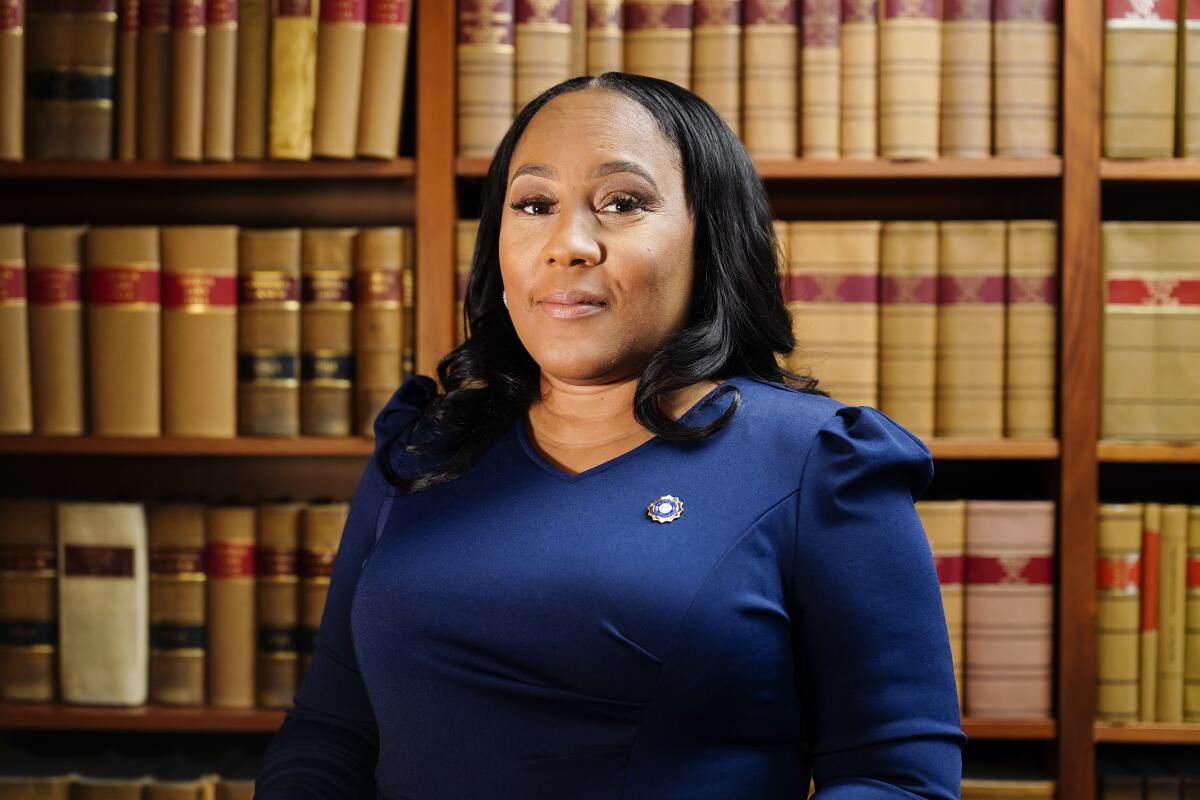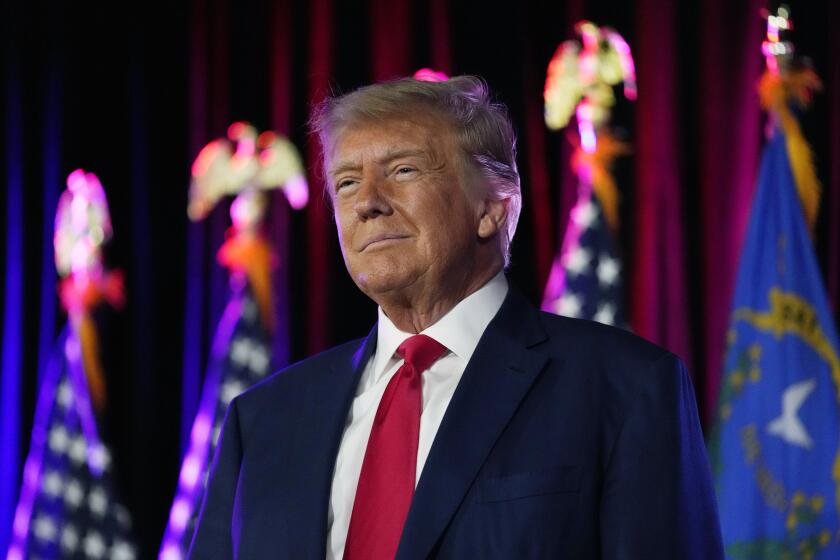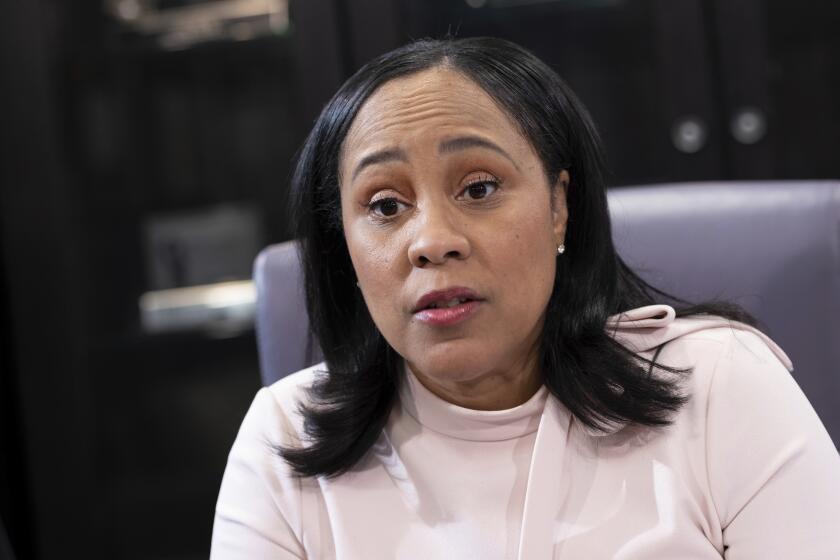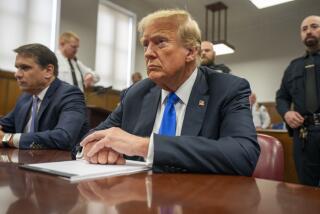Opinion: Why Georgia might beat the feds at holding Trump accountable

- Share via
In Fulton County, Ga., Donald Trump and others are widely expected to be indicted any day for attempting to illegally reverse Joe Biden’s victory in that state in 2020. Trump’s alleged interference includes his infamous call with Brad Raffensperger, Georgia’s secretary of state, in which Trump cajoled him to “find” 11,780 votes so he could overtake Biden’s lead.
In Michigan, three allies of Trump, including last year’s Republican nominee for state attorney general, were indicted in state court for engaging in a plot to illegally seize voting machines and examine them in a failed attempt to prove a Trump victory in the state.
And in Michigan and elsewhere, “fake electors” who purported to cast electoral college votes for Trump in states that Biden won are facing or may face an array of state charges of forgery, fraud and other crimes.
You might be tempted to see these criminal proceedings in state courts as a superfluous sideshow to Trump’s federal indictment on charges related to overthrowing the 2020 election. In fact, these parallel cases are essential to protecting American democracy in three ways.
Georgia’s highest court has rejected former President Trump’s request to block a district attorney from prosecuting him for his actions in wake of the 2020 election.
First, state charges could stick against Trump in a way that federal charges might not. If Trump is elected president again in 2024, he would have the capacity to have federal special counsel Jack Smith fired, and he could direct his handpicked attorney general to shut down any still-pending federal prosecutions. He could even try to pardon himself, although the legality of self-pardons is uncertain.
But even a newly inaugurated President Trump could not fire Fani Willis, the Georgia district attorney investigating his crimes in that state — or any other state official. He couldn’t call a halt to their investigations or indictments, although if he were indicted after reelection, he could probably delay the case until the end of his term.
Most important, state crimes are not subject to pardon by the president. To the extent that Trump needs to be held accountable and deterred from future election subversion or other crimes through prosecution, the state route is as promising, if not more so, than the federal one.
Second, Trump is not the only person who allegedly engaged in election subversion in 2020 and 2021, and the states are likely to be the most promising path for holding the others accountable too.
The partial report includes concerns from the special grand jury in Georgia that witnesses had lied under oath.
So far, the federal government has indicted or convicted more than 1,000 people for Jan. 6, 2021-related violence and seditious conspiracy related to the Capitol invasion, but no one other than Trump has been charged or tried in federal court for the machinations in the states and in Washington to reverse Joe Biden’s election. The Department of Justice may eventually go after some of these people, but that is far from certain.
Finally, the state prosecutions remind us that American elections are decentralized and that the safeguarding of our democracy cannot just be the responsibility of the federal government.
In the U.S. Constitution, each state and Washington, D.C., are assigned a specific number of presidential electors, but the rules for choosing those electors are left primarily to the states. States legislatures, in turn, delegate most of the management of elections to counties or other smaller government units, further decentralizing control over elections.
Those who attempted to steal the 2020 election from Biden sought to leverage this intense decentralization by finding willing participants at every level of government who would claim fraud, illegality, voting machine malfunctions or something else as a predicate to undoing a result that proved — in recounts, court cases and investigations — to be fair and accurate.
The prosecutor investigating possible illegal meddling in the 2020 election in Georgia has agreed to immunity deals with at least eight fake Republican electors.
The state prosecutions should help to show just how vulnerable to manipulation our voting systems are. Is there an “insider threat” from those working for state or local election officials with access to voting machinery and voter data? Does the state have an adequate set of rules to ensure that the correct electoral college votes will be transmitted to Congress? Is there adequate opportunity to observe ballot tallying? Are electoral procedures transparent and checkable?
The one downside of state prosecutions is timing. They could throw a monkey wrench into the federal effort to prosecute Trump for his most serious crimes before the 2024 election. And yet there remains a more than negligible chance that the federal case will be delayed anyway, given the factual and legal complexities of the case.
In that case, a state prosecution such as the one expected in Georgia — which involves an alleged conspiracy in just a single state — could be the only hope of holding Trump criminally accountable before he stands again in front of voters in 2024.
Richard L. Hasen is a professor of law at UCLA and the director of the Safeguarding Democracy Project. His latest book, “A Real Right to Vote: How a Constitutional Amendment Can Safeguard American Democracy,” will be published in 2024.
More to Read
A cure for the common opinion
Get thought-provoking perspectives with our weekly newsletter.
You may occasionally receive promotional content from the Los Angeles Times.













